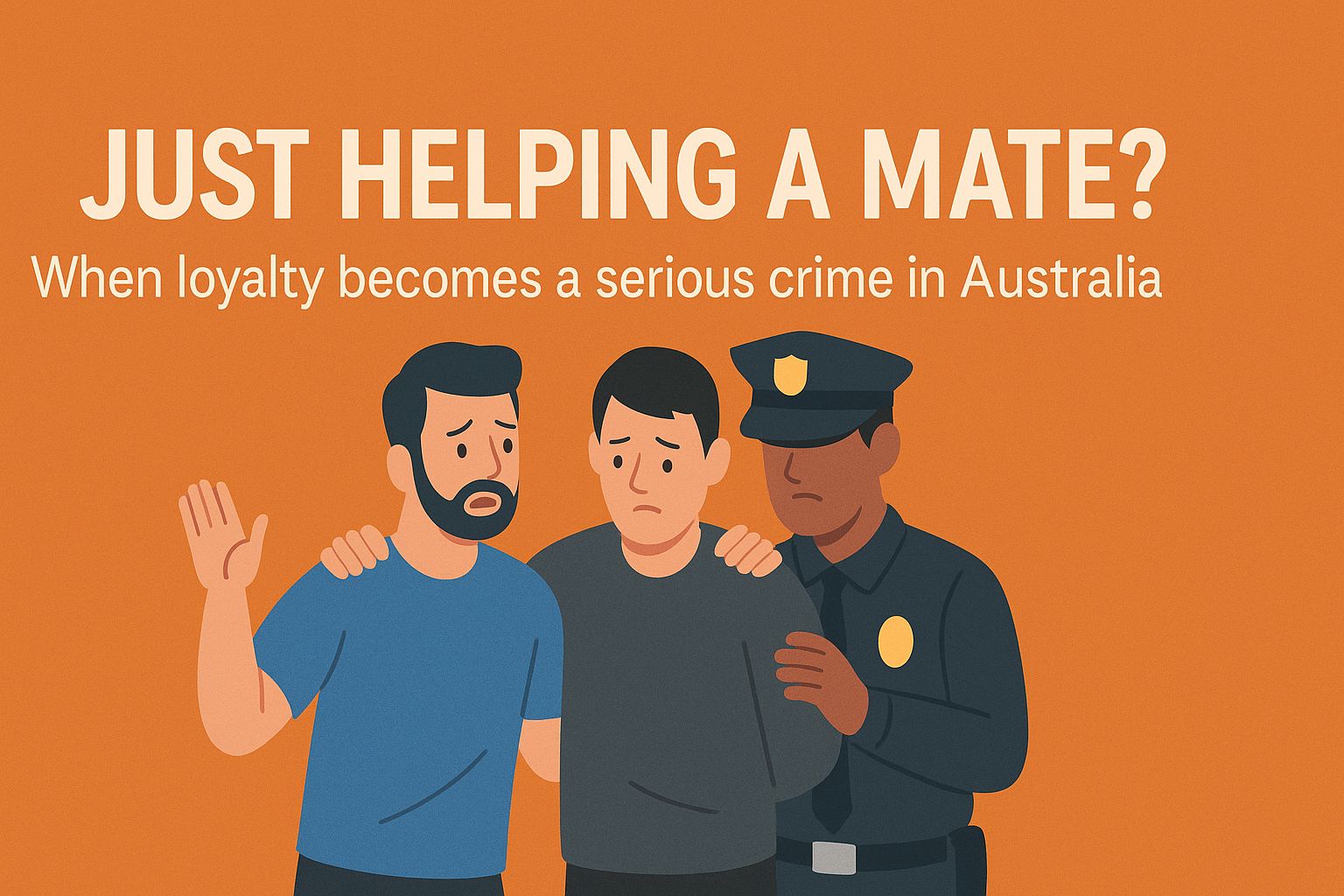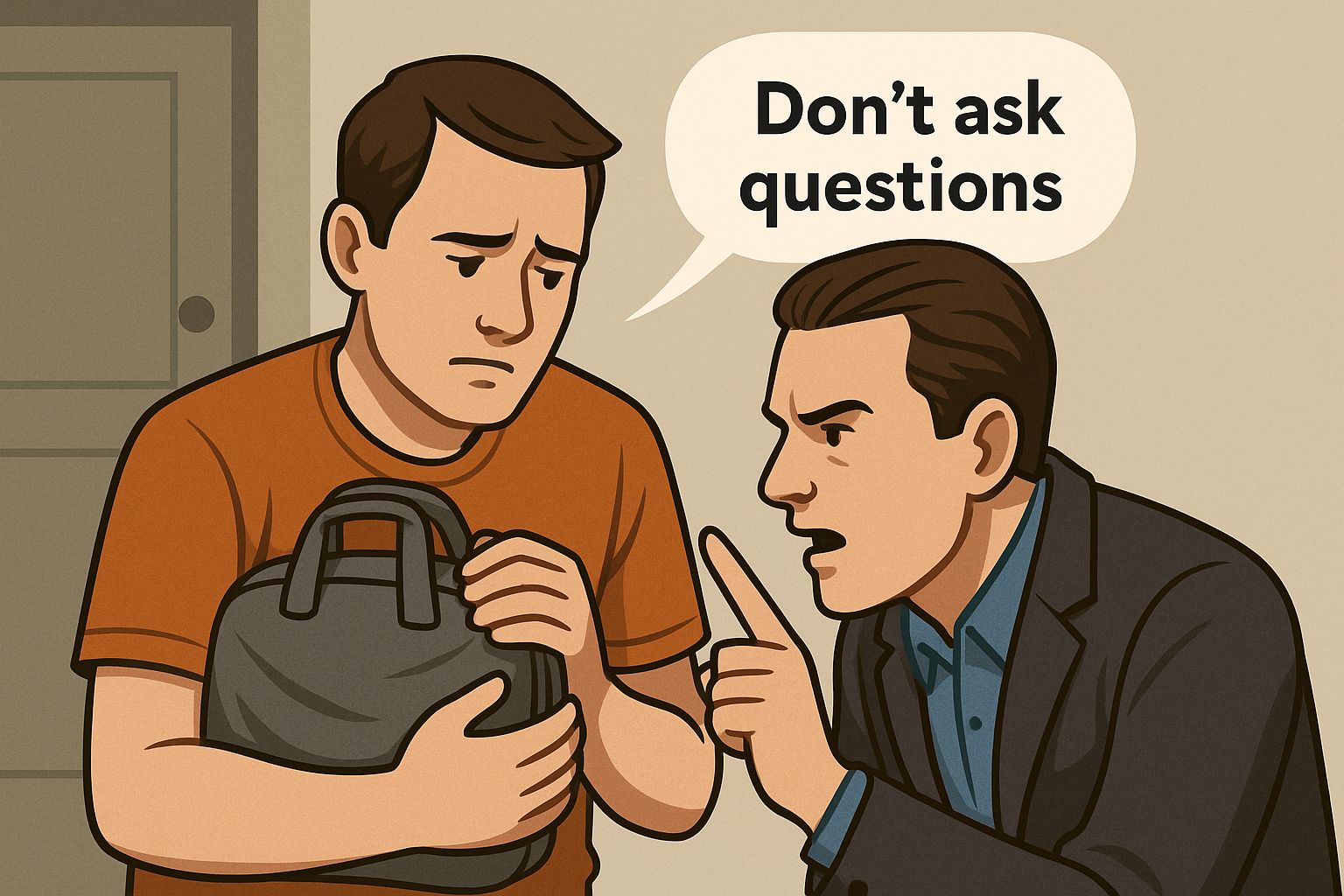Just Helping a Mate? When Loyalty Becomes a Serious Crime in Australia

Key Takeaways
Loyalty vs. The Law: Acts of loyalty intended to help a friend in legal trouble—such as lying to police or hiding them—are not seen as "helping" by the law. They are serious criminal offences.
Key Offences: These acts can lead to charges like Perverting the Course of Justice, being an Accessory After the Fact to a crime, and Receiving Stolen Goods.
Severe Penalties: These are not minor offences. A conviction can result in a criminal record and significant terms of imprisonment, sometimes almost as severe as the original crime itself.
Protect Yourself First: The best way to help a friend in legal trouble is to advise them to seek a lawyer, not to become a criminal yourself. You must seek your own independent legal advice if you are asked to get involved.
Introduction
In many cultures, loyalty to friends is a profound virtue. The idea of "义气" (yìqì)—a code of honour and brotherhood—or the Australian ideal of "mateship" means standing by your friends, especially when they are in trouble. But in the eyes of Australian law, some acts of "helping a mate" cross a dangerous line, turning a well-intentioned person into a criminal.
People with no criminal history often find themselves facing serious charges simply because they tried to protect a friend. They didn't commit the original crime, but their actions afterwards made them guilty of a separate, serious offence.
This guide explores three common "helping a friend" traps that can lead to criminal convictions in Australia.
Important Note: The laws governing these offences are found in both state legislation (like the Crimes Act 1900 (NSW)) and common law. This article uses NSW law as a primary example.
Learn more about the Crimes Act 1900 in NSW at NSW Legislation.
The Legal Principle: Why "Helping" Can Be a Crime
The Australian justice system is designed to function based on truth and transparency. Any action that is deliberately intended to mislead police, hide evidence, or help a guilty person escape justice is seen as an attack on the system itself.
The law does not make exceptions for loyalty. Your legal duty is to not interfere with an investigation or the course of justice. When you choose to help a friend break the law or evade capture, you are making a choice to commit a crime yourself.
Three Common "Helping a Friend" Traps That Are Serious Crimes
Scenario 1: Providing a False Alibi ("He was with me.")
The Situation: Your friend is being investigated for an offence and asks you to tell the police that they were with you at the time the crime was committed. It seems like a simple lie to help them out.
The Crime: This is not a "white lie." This is a deliberate act to mislead a police investigation. It can lead to a charge of Perverting the Course of Justice or Hindering a Police Investigation. As we covered in our guide on Offences Against Justice, these are very serious crimes. The police and courts see this as a direct attempt to corrupt the truth-finding process.
The Consequence: A conviction for this offence often carries a penalty of imprisonment, as it strikes at the heart of the justice system.
Scenario 2: Hiding a Wanted Friend (Harbouring an Offender)
The Situation: You find out your friend is wanted by the police. They show up at your door asking for a place to stay for a few nights, for a lift to another city, or for some cash to help them lie low.
The Crime: This is the classic definition of being an Accessory After the Fact. To be guilty, the prosecution must prove:
A serious crime was committed by your friend (the principal offender).
You knew about the crime.
You provided assistance with the intent of helping them escape justice.
Giving them a place to sleep, food, money, or transport all count as providing assistance.
The Consequence: The penalties for being an accessory are extremely severe and are often linked to the penalty for the original crime. You are risking a long prison sentence for a crime you did not even commit.
Scenario 3: Handling Stolen Goods ("I got a great deal.")
The Situation: Your friend offers to sell you a brand-new laptop or a luxury handbag for a price that seems too good to be true. You suspect it might be stolen, but you buy it anyway because it's a bargain.
The Crime: This is the offence of Receiving Stolen Goods. The law often goes further, with a charge of "goods in personal custody reasonably suspected of being stolen." For this charge, the police don't even have to prove the goods were stolen, only that you were in possession of them and that there was a reasonable suspicion they were stolen.
"Willful blindness"—deliberately avoiding asking questions because you don't want to know the answer—is not a defence. If the circumstances are highly suspicious, the law may assume you knew or believed the goods were stolen. This is a specific type of dishonest acquisition, related to the principles in our guide on Theft/Larceny.
The Consequence: This offence carries penalties including fines and imprisonment, depending on the value of the goods. You will also get a criminal record for an offence of dishonesty.
What You Are Risking
By trying to "help" a friend in these situations, you are not just risking a fine. You are risking:
A serious criminal record that can affect your employment and ability to travel.
Substantial fines.
A term of imprisonment.
A negative impact on your own visa or immigration status.
You risk ruining your own life in a misguided attempt to protect a friend who has put you in an impossible position.
Frequently Asked Questions (FAQ)
Potentially, yes. You could be in possession of stolen goods or drugs. "Willful blindness" is not a reliable defence. Refusing to take the bag is the only safe option.
In some rare cases, a defence of "duress" (being forced to commit a crime under threat of serious harm) may be available. However, this is extremely difficult to prove and requires you to have no safe avenue of escape. You should never rely on this without speaking to a lawyer.
The person who commits the original crime (e.g., the robbery) is the "principal offender." The person who knowingly helps them afterwards to escape is the "accessory after the fact." They are separate crimes, but both are very serious.
The only legal and truly helpful way to help a friend in this situation is to advise them to stop talking and contact a criminal lawyer immediately. Do not discuss the facts of the case with them. Do not offer to lie for them or hide them.
True loyalty does not mean breaking the law for someone else. When a friend asks you to lie to police, hide them from justice, or handle stolen property, they are not asking for your help—they are asking you to risk your own future.
The Australian legal system is built on the expectation that citizens will cooperate with the truth-finding process, not obstruct it. Choosing to protect a friend by committing a crime can result in two lives being ruined instead of one. If you find yourself in this difficult position, your priority must be your own legal safety. Seek independent legal advice immediately.

AHL Legal: Your Partner in Navigating Criminal Law
Facing legal issues related to helping a friend or need guidance on Australian criminal laws? At AHL Legal, we provide expert legal advice and representation to protect your rights and ensure compliance with the law.
Stay Safe, Stay Legal
Helping a friend should never mean breaking the law. Understand the risks of charges like Perverting the Course of Justice or being an Accessory After the Fact to protect your future.
At AHL Legal, we offer professional legal support to guide you through these complex situations and safeguard your interests.
✅ AHL Legal: Your Trusted Legal Partner
Our experienced team is dedicated to providing clarity and protecting your rights under Australian criminal law.
📞 Ready to take action? Call us at 1300 91 66 77 for a consultation
🌐 Visit our website: www.ahllegal.com



 1300 91 66 77
1300 91 66 77







 HOME
HOME


